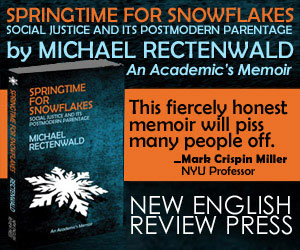Method In Their Madness: Review of Michael Rectenwald’s Springtime for Snowflakes
 Springtime for Snowflakes: Social Justice and its Postmodern Parentage
Springtime for Snowflakes: Social Justice and its Postmodern Parentage
Michael Rectenwald
Nashville, Tenn.: New English Review Press, 2018
The takeover of academia by the far Left during the last several decades has been well documented. What sets Michael Rectenwald’s (MR) Springtime for Snowflakes apart is a rare insider’s critical appraisal of the ideologies and machinations of critical theory, postmodernism, social justice, and transgender theory. The book is in part an academic’s memoir and in part an ideological analysis of the various socially destructive beliefs and theories ensconced within the ivy-covered halls. “Snowflakes is a first-person embodiment of the postmodern perspective, the result of a deep and extended immersion” (xiii). Rectenwald is an apostate from the radical Left. “I had identified as a left or libertarian communist. . . . I became a well-respected Marxist thinker and essayist. I had flirted with a Trotskyist sect” (28).
At first glance MR seems an unlikely recruit for the far-Left. He is a product of a large working-/lower- middle-class German Catholic family from Pittsburgh. He attended Catholic secondary schools. Rectenwald recounts one incident that contributed to his embrace of the Left. As an eighth grader he and his father went to interview at Shadyside Academy. The headmaster informed the senior Rectenwald that although his son could do well there academically, socially he was not a good fit. “This experience and others like it increased the chances that if ever exposed to it, I would seriously entertain Marxism” (34).
The author notes that class resentment still fuels the Left, but what about ethnic resentment? Was Ted Kennedy motivated to pass the 1965 immigration act, in part, because his grandfather was snubbed by some Boston Brahmin? Does Chris Cuomo support Antifa because his grandfather was called a Guinea on the streets of New York? The contemporary Left has been moving away from class issues into racial and sexual politics. MR grapples with both race and gender, though he is more comfortable analyzing the latter. Read more







